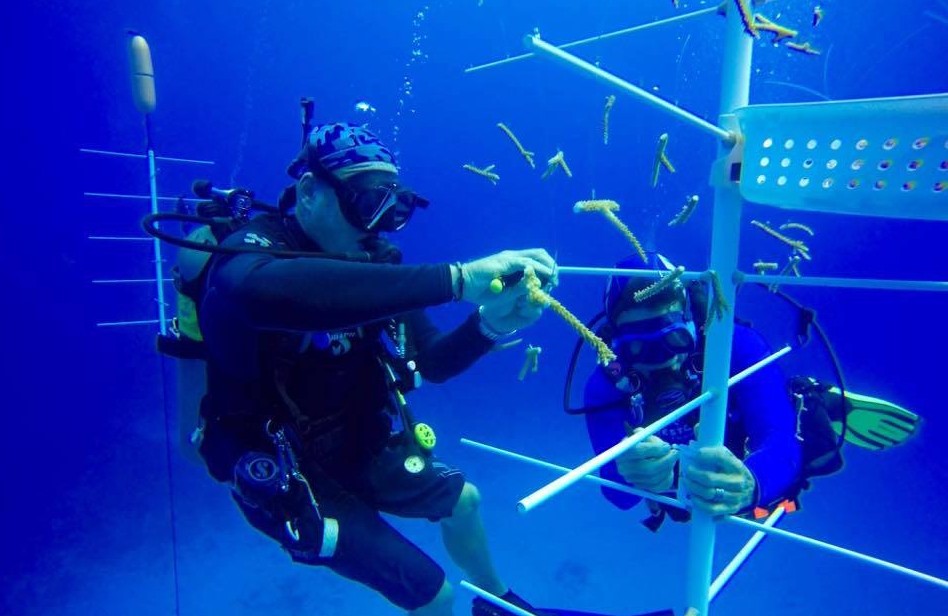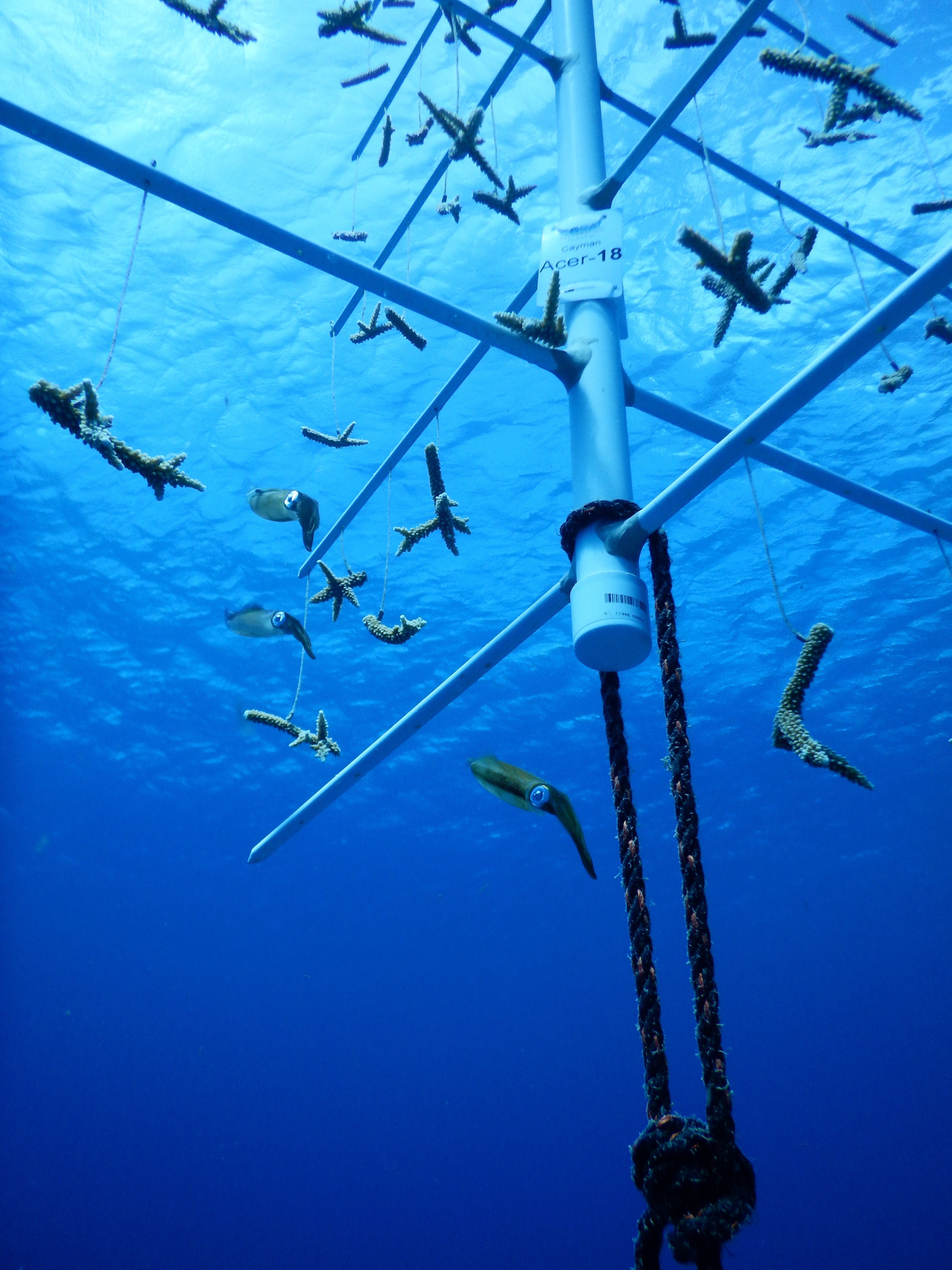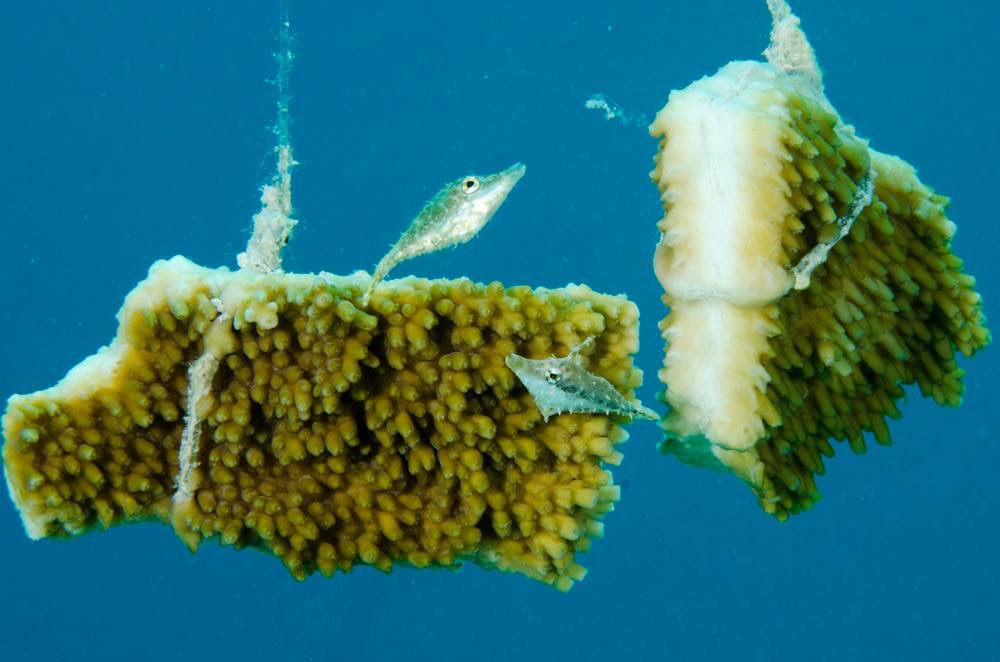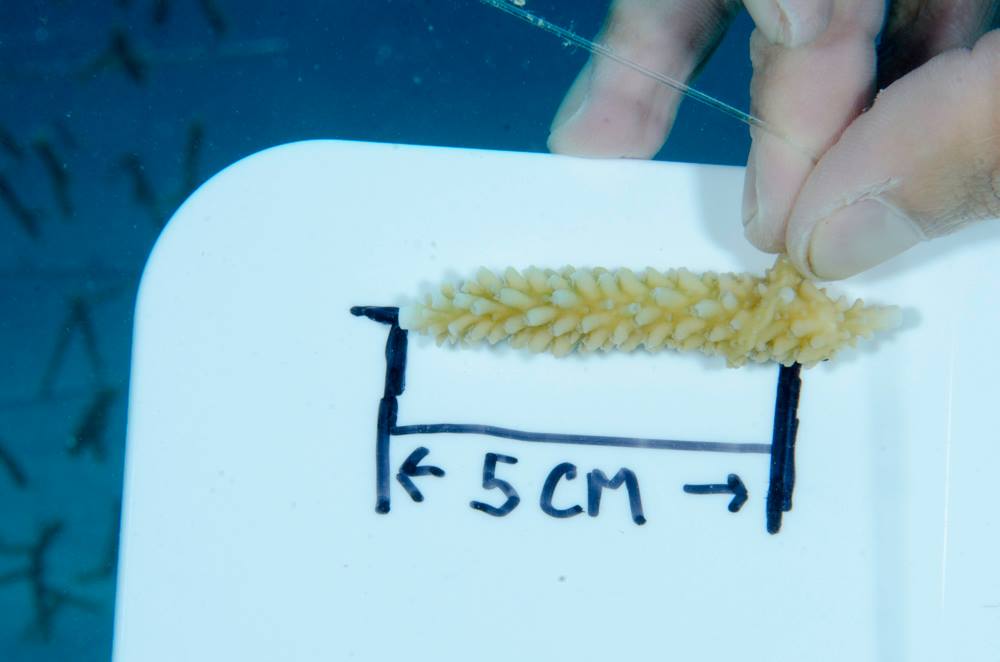Marine Life & Conservation
Cayman’s Coral Nursery Program Launched with High Hopes

After only a few short weeks, hundreds of coral fragments hanging from “trees” made of PVC pipe in the shallow waters of Grand Cayman are showing healthy signs of life and attracting fish. Ocean Frontiers, Sunset House and Divetech are gardening coral that will be used to replenish Cayman’s reefs. The Cayman Islands Department of Environment granted the operators permits to set up the coral nurseries and is overseeing their individual programs.
 “So far everything looks great! There has been zero mortality from the collected coral,” says Lois Hatcher who is managing the nursery for Ocean Frontiers. “We are doing weekly maintenance on the site and setting up a report for the Department of Environment. The fragments are being monitored for disease, photographed and measured. They already show visible growth after just a few weeks.”
“So far everything looks great! There has been zero mortality from the collected coral,” says Lois Hatcher who is managing the nursery for Ocean Frontiers. “We are doing weekly maintenance on the site and setting up a report for the Department of Environment. The fragments are being monitored for disease, photographed and measured. They already show visible growth after just a few weeks.”
The coral trees were set up in late April with the help of Sea of Change Foundation, an ocean conservation non-profit that donated money and materials to construct the PVC trees, plus guidance and manpower. Experts from the Coral Restoration Foundation were brought in to help install the trees and train the dive operators in how to manage the nurseries.
“Every year the Foundation picks a project that we believe will make a difference in saving our seas, and this year we picked Cayman’s coral nursery program,” said board member Jerry Beaty. “We’ve seen this method succeed in other places and because Cayman is such a prime dive destination, we want to do what we can to keep it that way.”
Each coral tree, which can hold about 100 coral fragments, is anchored to the sea bottom with rope and can float with the currents, even during storms and hurricanes. The coral fragments feed from the nutrient-rich currents and they grow. Cayman’s nurseries contain fast-growing Staghorn Corals. Nursery tenders clean and maintain the coral trees to find the strongest corals which will then be used to “seed” local reefs.
“I was out cleaning the nursery the other day and everything looks very healthy and all of the fragments have already grown over the fishing line that is attaching them to the trees. Very exciting!” says Jo Mikutowicz, Divetech.
“The staghorn has already grown between .5 cm to 2.5 cm based on the 5 cm baseline fragments that were hung. On the Elkhorn it’s great to see the mono that was wrapped around the fragment as they have overgrown already,” said Lois Hatcher.
The Sunset House coral nursery has attracted a small school of curious squid.
“The nursery is doing very well, and there’s also a lot of interest from guests,” says General Manager Keith Sahm. “The trees are strategically placed and depth changeable to accommodate the nursery, and keep it safe from a late season Nor’wester.”
Dive operators, staunch advocates for protection of the marine environment, have always enforced conservation measures to reduce the stress on Cayman’s reefs from divers. The chance now to be directly involved in growing coral to seed and boost the reefs is exciting and fills them with purpose.
“It requires a lot of work on Divetech’s part to maintain the coral trees weekly, to keep algae off of them and keep any predators (snails and fire worms) off the coral,” explains Jo Mikutowicz. “We are very dedicated to this nursery program being a success and will put in all the work that is required to maintain them.”
With coral reefs threatened worldwide from overfishing, rising water temperatures, ocean acidification, pollution and more, Cayman’s operators are excited about the good things that will result from their new coral nurseries.
“It sometimes seems like there is a lot working against coral to stay alive and be healthy these days so it’s nice to finally be able to be proactive in reversing the damage to the reefs and to be able to create new reefs,” said Mikutowicz.
“It will be very successful, there is no reason for it not to be,” says a confident Lois Hatcher, who has co-managed the successful coral restoration project in George Town Harbour started a year ago to repair reef damage from a ship anchor.
“At the Carnival Magic site we have out planted already and those are doing well. Cayman reefs will never be the same as they were 100 years ago or even 20 years ago but we can slow down and maintain the loss which means there is hope. As long as there is hope we need to continue,” she said.
Blogs
The Ocean Cleanup Breaks 10,000,000 KG Barrier

The Ocean Cleanup, the global non-profit project, has removed a verified all-time total of ten million kilograms (22 million lbs.) of trash from oceans and rivers around the world – approximately the same weight as the Eiffel Tower.
To complete its mission of ridding the oceans of plastic, The Ocean Cleanup uses a dual strategy: cleaning up the Great Pacific Garbage Patch (GPGP) to remove the plastic already afloat in the oceans, while stopping the flow of plastic from the world’s most polluting rivers.
Through cleaning operations in the GPGP and in rivers in eight countries, the cumulative total of trash removed has now surpassed ten million kilograms. This milestone demonstrates the acceleration of The Ocean Cleanup’s impact, while underlining the astonishing scale of the plastic pollution problem and the need for continued support and action.
While encouraging for the mission, this milestone is only a staging point: millions more tons of plastic still pollute our oceans and The Ocean Cleanup intends to continue learning, improving and innovating to solve this global catastrophe.
This announcement comes as governments from around the world meet to continue negotiations to develop a new legally binding instrument to end plastic pollution at INC4 in Ottawa, Canada. Representatives of The Ocean Cleanup will be in attendance and the organization will be urging decision-makers to collaborate towards a comprehensive and ambitious global treaty which addresses plastic at all stages of its life cycle and in all marine environments worldwide, including in areas beyond national jurisdiction.
It is encouraging to see that the need for remediation is reflected in the various options for potential treaty provisions. It is essential that the final treaty contains clear targets for the remediation of legacy plastic pollution, and reduction of riverine plastic emissions.
Tackling plastic pollution requires innovative and impactful solutions. The treaty should therefore incentivize the innovation ecosystem by fostering innovations that make maximal use of data, technology and scientific knowledge – such as those designed and deployed by The Ocean Cleanup.
‘After many tough years of trial and error, it’s amazing to see our work is starting to pay off – and I am proud of the team who has brought us to this point.’ said Boyan Slat, Founder and CEO of The Ocean Cleanup. ‘While we still have a long way to go, our recent successes fill us with renewed confidence that the oceans can be cleaned.’
The Ocean Cleanup was founded in 2013 and captured its first plastic in 2019, with the first confirmed catch in the GPGP coming soon after the deployment of Interceptor 001 in Jakarta, Indonesia. After surpassing one million kilograms of trash removed in early 2022, the non-profit project has since progressed to the third iteration of its GPGP cleaning solution, known as System 03, and a network of Interceptors currently covering rivers in eight countries, with more deployments set for 2024.
About The Ocean Cleanup
The Ocean Cleanup is an international non-profit organization that develops and scales technologies to rid the world’s oceans of plastic. They aim to achieve this goal through a dual strategy: stemming the inflow via rivers and cleaning up the legacy plastic that has already accumulated in the ocean. For the latter, The Ocean Cleanup develops large-scale systems to efficiently concentrate the plastic for periodic removal. This plastic is tracked and traced through DNV’s chain of custody model to certify claims of origin when recycling it into new products. To curb the tide via rivers, The Ocean Cleanup has developed Interceptor™ solutions to halt and extract riverine plastic before it reaches the ocean. Founded in 2013 by Boyan Slat, The Ocean Cleanup now employs a broadly multi-disciplined team of approximately 140. The foundation is headquartered in Rotterdam, the Netherlands.
For more information, visit: theoceancleanup.com and follow @theoceancleanup on social media.
Marine Life & Conservation
Steve Backshall to headline Shark Trust’s flagship event: For the Love of Sharks

Join a host of amazing, shark loving, speakers including Steve Backshall and the Shark Trust team for an evening celebrating shark conservation at the Royal Geographical Society in London this November.
Date: 29th November 2024
Time: 6-10pm
Location: Royal Geographical Society, London
Tickets: https://www.sharktrust.org/Event/flos24
The event will be a celebration of all things shark. Those lucky enough to get hold of tickets will hear from engaging guest speakers with a passion for sharks.
The line-up includes (*subject to change if unforeseen circumstances arise)
Steve Backshall: One of television’s busiest presenters, BAFTA award-winning wildlife expert Steve has been passionate about the wild world ever since he was young.
Steve’s impressive TV career has taken him all around the world, investigating a wide array of species and environments. Steve has filmed over 100 hours of children’s wildlife programmes with the BAFTA award winning Deadly 60 franchise and recently, with Sky Nature, for his new series ‘Whale with Steve Backshall’. He has been a patron for the Shark Trust for 10 years.
Simon Rogerson: is a photojournalist specialising in natural history, diving and the sea.
He is editor of SCUBA magazine, the official journal of the British Sub-Aqua Club. Simon started his career as a crime reporter but gravitated towards his ‘less depressing’ interest in underwater exploration, joining the staff of DIVE magazine in 1999. In 2005 he was named ‘Editor of the Year’ in the PPA’s Independent Publishing Awards. Simon also works as a freelance writer, contributing frequently to the Sunday Times and Telegraph, in addition to BBC Wildlife, Esquire, and a host of international diving magazines. He is the author of a book, Dive Red Sea, published by Ultimate Sports. Now based in Berkshire, Simon has been a Patron of the Shark Trust for 20 years.
More speakers to be announced soon. Head to the Shark Trust website to learn more.
The evening will also allow guests the final chance to see the Oceanic 31, shark art exhibition. Some of the artwork will be auctioned/raffled at the event, while the rest will be auctioned online to raise money for the Shark Trust Oceanic Programme.
For the Love of Sharks is an evening with something for everyone who is interested and fascinated by sharks. Join the Shark Trust, their Patrons, Trustees and Staff, along with a host of supporters for this celebration of shark conservation.
For more information or to buy a ticket: https://www.sharktrust.org/Event/flos24
-

 News3 months ago
News3 months agoCapturing Critters in Lembeh Underwater Photography Workshop 2024: Event Roundup
-

 Marine Life & Conservation Blogs3 months ago
Marine Life & Conservation Blogs3 months agoCreature Feature: Swell Sharks
-

 Blogs2 months ago
Blogs2 months agoMurex Resorts: Passport to Paradise!
-

 Blogs2 months ago
Blogs2 months agoDiver Discovering Whale Skeletons Beneath Ice Judged World’s Best Underwater Photograph
-

 Gear Reviews3 weeks ago
Gear Reviews3 weeks agoGEAR REVIEW – Revolutionising Diving Comfort: The Sharkskin T2 Chillproof Suit
-

 Gear Reviews3 months ago
Gear Reviews3 months agoGear Review: Oceanic+ Dive Housing for iPhone
-

 Marine Life & Conservation2 months ago
Marine Life & Conservation2 months agoSave the Manatee Club launches brand new webcams at Silver Springs State Park, Florida
-

 News2 months ago
News2 months agoPADI Teams Up with Wellness Brand Neuro to Drive Ocean Change and Create a Blue State of Mind







